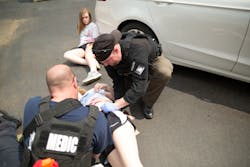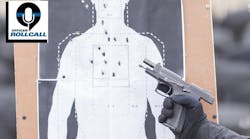One: Get onboard with the benefits
As police officer there is the responsibility to “protect and serve” the public. You need to realize that adding medical equipment and training to your department can have a profound impact on the lives of community members that become victims of trauma. As an administrator or member of the leadership of your department, you need to realize you have responsibility for your officers’ safety and reputation of your department. As I stated earlier, training and equipment do have a cost associated with them but we need to consider the bigger picture and realize this now a part of our job. One needs to look at the public image our officers project. Are your officers just the “enforcers” or are they the people that your community wants during any emergency? A few saved lives will go a long way with a positive perception of your agency.
Whether the excuse is time, money or my personal favorite “we don’t have a need for that in my area”, you need to consider what threats your community and officers may face and take that in to account when making your decision.
If your department is too small to afford an entire training class, consider partnering with other agencies in your area.
Two: Use an approved curriculum
Many departments want to save money and draw upon the expertise of their officers and come up with their own curriculum. I urge you to use extreme caution when doing this. The guidelines for TCCC may change as frequently as every 4 months. You want to make sure the guidelines you are teaching are consistent with the current acceptable practices. If you want to teach your own curriculum, make sure that your department has a medical director/doctor that is willing to approve the material.
If you choose to use a third-party curriculum, make sure that it is nationally recognized and certified. There are many programs out there that appear to be nationally recognized programs or result in a certification that are not. By choosing a nationally recognized certification, you are placing the responsibility of curriculum and instructor qualifications on a third-party and not your department. My suggestion would be look at the programs such as “Bleeding Control Basics” by the American College of Surgeons or the Tactical Emergency Casualty Care, Tactical Combat Casualty Care and Law Enforcement First Response- Tactical Casualty Care by the National Association of EMTS.
Three: Choose competent instructors
If you use your own instructors, keep in mind that this is something that should be taught by someone that not only has a medical background but also understands the unique challenges that police officers face. Ideally it should be someone that is familiar with treating a patient in a high stress situation. It is easy for anyone to read from a PowerPoint presentation, but it’s important to have an instructor that can stress the importance of the training based on personal/professional experience.
It may be easier for departments to consider a third-party vendor to teach the program. The vendor should be responsible for the certified curriculum, roster management, issuing your certificates and handling the administrative side of your program. This frees up your training department and saves money in the long run by absorbing your administrative costs. The vendor should also be able to provide you with instructor resumes and qualifications and you should be able set your minimum standards for instructors. If you choose to use a third-party vendor, do your homework and check references and qualifications. There are many vendors that appear good on paper but show up with a few beat up tourniquets and no real-life experience that claim to be “Tac Med Instructors”.
Four: Choose the right class
Many departments choose to just show a video or powerpoint and call it training. Make sure that your programs include hands-on training that allow officers to build muscle memory experience quality training. The skills being taught need to be physically performed to get the most benefit for your training budget. When we teach even our most basic class, we use the Techline Trauma Wounds in a Box and Bleeding Control Part Task Trainer to give the students the experience of stopping a bleed and the amount of effort it requires. Ideally the class would include realistic scenarios and realistically moulaged actors. Realistic scenarios can drive the point home that these are real life situations that can occur any day. Realistic patients with realistic looking injuries allow the students to see immediate feedback of the medical interventions performed.
Five: Choose the right equipment
We know that the “Trauma Kit” that is in most patrol cars is a dirty beat up medical bag consisting of a few yellowed gauze pads and small band-aids. This is no longer acceptable. When choosing what medical gear you should buy, you need to stick to products that are both clinically researched and proven. We recommend the products approved by the Committee on TCCC. There are many companies producing tac med products like tourniquets that have no clinical research behind them.
You also want to make sure that your officers have a carrying option that will allow them to carry at least a tourniquet on their person always. There should also be a more comprehensive kit that officers can grab if they are going into a high threat situation.
Six: Make medical training a routine
Don’t be afraid to do tourniquet drills in roll call. Don’t be afraid to have officers practice “fighting through an injury” by doing firearm or movement drills while wearing tourniquets.



